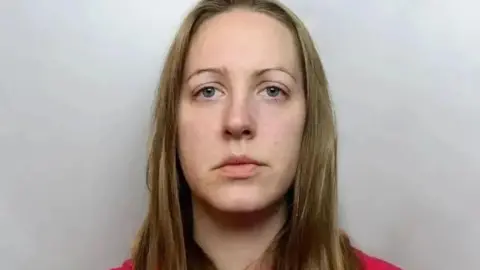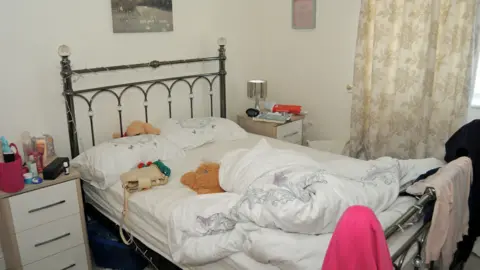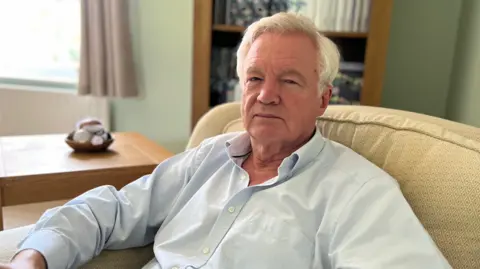Who is Lucy Letby and what sentence did she get?
 BBC
BBCIt is now approaching two years since Lucy Letby was told she would die in prison after being given 15 whole-life sentences.
The 35-year-old murdered seven babies and attempted to murder seven others, with two attempts on the life of one of them, making her the most prolific child serial killer in British legal history.
Since her conviction, a highly vocal campaign has protested her innocence, but investigations continue into whether she may have committed other crimes against children before she was caught.
Earlier the police confirmed a "full file of evidence" had been passed to prosecutors who would consider fresh charges relating to the non-fatal collapse and deaths of babies in Chester and Liverpool.
Who is Lucy Letby?
Her trial at Manchester Crown Court revealed Letby to have lived an unremarkable life before her arrest in July 2018, with detectives who worked on the case describing her as "the human form of beige".
Born in Hereford in January 1990, she attended a local school and sixth form and, she told jurors, "always wanted to work with children".
She was the first person in her family to go to university and studied nursing for three years at the University of Chester.
 Cheshire Police
Cheshire PoliceDuring her studies and training she had placements at the Countess of Chester Hospital and Liverpool Women's Hospital.
Letby qualified as a band five nurse in 2011, and was considered competent and capable by the majority of her colleagues.
But the public inquiry set up to examine how she was able to murder children under the noses of her colleagues heard she initially failed her final year student placement because her assessor felt she was "cold" and "lacked empathy" with patients and their families.
Letby appealed that decision, however, and passed with a new assessor.
At the time of her arrest she was living in a modest semi-detached property in Westbourne Road, Chester, with two cats, Tigger and Smudge, and appeared to have an active social life.
What did Lucy Letby do?
Over the course of a nine-month criminal trial, a jury heard that Letby was present at a series of "unexplained" deaths and sudden collapses of vulnerable babies on the neonatal unit where she worked.
The indictment - the list of charges she faced - focused on the period between June 2015 and June 2016, when Letby was removed from frontline duties.
Prosecutors said she attacked babies by injecting air into their bodies, by force feeding them, by poisoning them with insulin, and in some cases by causing traumatic injuries by inflicting physical blows.
One piece of evidence presented in court was a staffing rota which showed only Letby was present at every single incident considered suspicious by the prosecution.
On 8 August 2023, the jury returned the first set of verdicts, before returning the second set on 11 August.
Letby was convicted of seven murders and six attempted murders, with not guilty verdicts on two counts of attempted murder.
The jury was deadlocked on another six counts.
After a retrial in July 2024, she was convicted of a further count of attempted murder.
 PA Media
PA MediaWhat happened next?
Letby almost immediately applied for leave to appeal her original convictions, which was refused on 4 July 2024 by the Court of Appeal.
However one significant detail did emerge in that process.
An academic paper by Dr Shoo Lee, a retired Canadian neonatologist, had been used by the prosecution at trial to highlight signs of vascular air embolism - the introduction of air bubbles into the veins - in newborns.
Dr Lee, who was unaware of his work being involved in the case during the trial, had been contacted by Letby's legal team, and stated his belief that his paper had been misinterpreted by prosecution experts.
Letby was also separately refused leave to appeal against her conviction from the retrial.
In September 2024, the Thirlwall Inquiry into the circumstances of Letby's offending began in Liverpool, and heard evidence over seven months.
The chairwoman of the inquiry, Lady Justice Thirlwall, had confirmed she would not hear evidence on whether Letby's convictions were safe, stating it was not the appropriate forum.
The inquiry is due to publish its findings early next year.
Innocence campaign
In the weeks and months after Letby was convicted, questions about the safety of her convictions were asked.
While some of it included online conspiracy theories, serious academics, including medical experts and statisticians, also questioned the case.
Conservative peer Sir David Davis announced he believed a miscarriage of justice had taken place and has since supported the campaign.
Last month, his Conservative Party colleague and former Health Secretary Jeremy Hunt said the case should be "urgently re-examined".
In February this year Letby's post-trial barrister, Mark McDonald, called a press conference featuring a panel of 14 international experts in neonatology and paediatric care, chaired by Dr Lee.
Dr Lee said the panel had independently reviewed the evidence heard at trial and concluded no murders or attempted murders had taken place.

Dr Lee said the panel believed the babies in question had died due to natural causes or poor medical care.
The report, along with other evidence, has been submitted in an application to the Criminal Cases Review Commission (CCRC), the statuatory body set up to examine potential miscarriages of justice.
The CCRC is reviewing the application and said it could take some time to reach a decision as to whether to refer the case back to the Court of Appeal for a full hearing.
The families of Letby's victims, through lawyers, have described the panel's report as a "rehash" and "full of analytical holes".
Criminal investigation continues
While Letby's legal team have been working to secure a new appeal, detectives on Cheshire Police's Operation Hummingbird, which was set up to investigate the events at the Countess of Chester, have been continuing their enquiries.
Shortly after Letby was convicted in 2023, the force announced it was still investigating non-fatal collapses and deaths of babies that were not included on the indictment - both in the Countess of Chester Hospital and Liverpool Women's Hospital.
In October that year, it also launched an unrelated but parallel investigation called Operation Duet, looking at potential offences of corporate or gross negligence manslaughter relating to the response of hospital leaders to rising death rates.
On Tuesday the force announced three former senior managers at the Countess of Chester had been arrested on suspicion of gross negligence manslaughter and had been bailed pending further enquiries.
On Wednesday, news broke that a "full file of evidence" had been handed by the Operation Hummingbird team to the Crown Prosecution Service (CPS) for a decision on whether to bring fresh charges against Letby.
In response, her barrister Mr McDonald said the evidence of her innocence was "overwhelming".
"We will cross every bridge when we get to it but if Lucy is charged I know we have a whole army of internationally renowned medical experts who will totally undermine the prosecution's unfounded allegations," he added.
Listen to the best of BBC Radio Merseyside on BBC Sounds and follow BBC Merseyside on Facebook, X, and Instagram, and watch BBC North West Tonight on BBC iPlayer.
